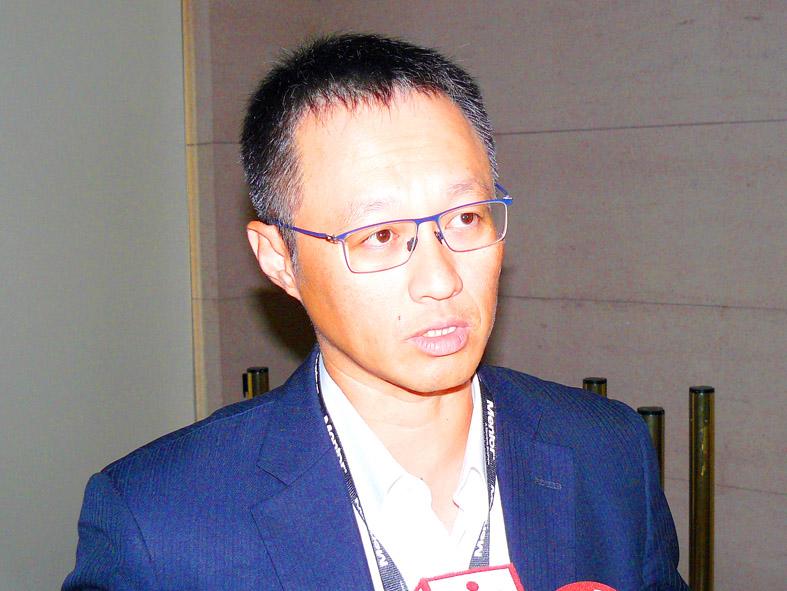Phison Electronics Corp (群聯電子), a supplier of NAND flash memory controllers and modules, yesterday said it has approved the resignation of Pua Khein-seng (潘健成) as chairman, after he was found guilty last month by a district court of financial statement fraud in 2016.
The Hsinchu-based company said that Pua took the initiative of resigning as chairman and board director to meet corporate governance requirements.
However, he is to stay as the company’s chief executive officer and will appeal the ruling, which sentenced him to two years in prison, the company said in a statement.

Photo: CNA
Pua’s resignation will not affect Phison’s operations, technology research and development, or its future goal of growing into a company with more than NT$100 billion (US$3.6 billion) in annual revenue, Phison said.
“Board directors support Pua remaining as CEO and leading the company in attaining that revenue goal,” it said.
Vice president and deputy product business head Gan Wee Kuan (顏暐駩) is to take over as chairman, it added.
The arrangement means that Pua, the largest individual shareholder of Phison, is to take charge of the responsibilities entrusted by the board and look after the long-term benefits of the company and shareholders, it said.
Phison reported NT$16.9 billion in revenue for last quarter and NT$2.38 billion in net income, or earnings of NT$12.1 per share, the second-highest in the company’s history.
Revenue in the first three quarters totaled NT$45.7 billion, while profit stood at NT$32.15 per share, company data showed.
Shares of Phison yesterday closed up 2.38 percent at NT$409, outpacing the TAIEX’s 0.44 percent gain, Taipei Exchange data showed.

TECH CLUSTER: The US company’s new office is in the Shalun Smart Green Energy Science City, a new AI industry base and cybersecurity hub in southern Taiwan US chip designer Advanced Micro Devices Inc (AMD) yesterday launched an office in Tainan’s Gueiren District (歸仁), marking a significant milestone in the development of southern Taiwan’s artificial intelligence (AI) industry, the Tainan City Government said in a statement. AMD Taiwan general manager Vincent Chern (陳民皓) presided over the opening ceremony for the company’s new office at the Shalun Smart Green Energy Science City (沙崙智慧綠能科學城), a new AI industry base and cybersecurity hub in southern Taiwan. Facilities in the new office include an information processing center, and a research and development (R&D) center, the Tainan Economic Development Bureau said. The Ministry

ADVERSARIES: The new list includes 11 entities in China and one in Taiwan, which is a local branch of Chinese cloud computing firm Inspur Group The US added dozens of entities to a trade blacklist on Tuesday, the US Department of Commerce said, in part to disrupt Beijing’s artificial intelligence (AI) and advanced computing capabilities. The action affects 80 entities from countries including China, the United Arab Emirates and Iran, with the commerce department citing their “activities contrary to US national security and foreign policy.” Those added to the “entity list” are restricted from obtaining US items and technologies without government authorization. “We will not allow adversaries to exploit American technology to bolster their own militaries and threaten American lives,” US Secretary of Commerce Howard Lutnick said. The entities

Minister of Finance Chuang Tsui-yun (莊翠雲) yesterday told lawmakers that she “would not speculate,” but a “response plan” has been prepared in case Taiwan is targeted by US President Donald Trump’s reciprocal tariffs, which are to be announced on Wednesday next week. The Trump administration, including US Secretary of the Treasury Scott Bessent, has said that much of the proposed reciprocal tariffs would focus on the 15 countries that have the highest trade surpluses with the US. Bessent has referred to those countries as the “dirty 15,” but has not named them. Last year, Taiwan’s US$73.9 billion trade surplus with the US

The Taipei International Cycle Show (Taipei Cycle) yesterday opened at the Taipei Nangang Exhibition Center, with the event’s organizer expecting a steady recovery in the industry this year following a tough last year. This year, 980 companies from 35 countries are participating in the annual bicycle trade show, showcasing technological breakthroughs and market development trends of the bicycle industry at 3,600 booths, the Taiwan External Trade Development Council (TAITRA, 外貿協會) said in a statement. Under the theme “Ride the Revolution,” the exhibition has attracted more than 3,500 international buyers from 80 countries to preregister for the four-day event, which is expected to